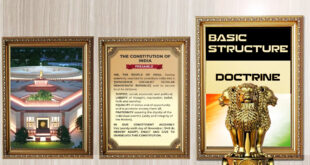The Government of India has reportedly suppressed its own data on current employment, or rather job loss, in the country. It has, thereby, compromised the autonomy and the standing of the National Statistical Commission. This is the latest instalment in the rather sordid story of institutional decay in India, overseen by the leaders of the Bharatiya Janata Party (BJP). This is not to suggest that previous governments did not undermine institutions. The internal Emergency imposed on the country from 1975 to 1977 initiated the process. The government tried to tame bureaucrats as well as the highest court in the land. Postings and appointments were manipulated to suit the ruling dispensation. The BJP government has, however, earned the dubious distinction of sabotaging the autonomy of several political institutions in rapid succession. Necessary checks Institutional decay occasions worry because it affects ordinary citizens in disastrous ways. All governments, even those which have been democratically elected, betray an inexorable will to power. Expectedly, expansion of government power violates constitutional rights to freedom, equality and justice. The only way citizens can be protected against any arbitrary and unlawful exercise of power is by limiting the power of government. Liberal democrats, always sceptical of state power, have tried to contain dramatic surges of power by charting out of constitutions and institutional design. Institutions, as the embodiment of formal and informal rules, assure citizens that the government exercises power according to some norms that enable as well as regulate state capacity. This makes for good political sense when we remember that most human activity is structured by systems of rules — take the intricate and rule-bound game of chess or cricket. Relationships, households, the economy, society, the games we play and do not play take place and develop within the framework of rules. Human beings are social, but we cannot be social unless we know what is expected of us, and what we should do or not do. Without rules that govern relationships — for example, the norm that friendship is based on trust— we will not know what is worthwhile and what is not, what is preferable and what should be avoided, and what is appropriate and what is expedient. The Canadian political philosopher Charles Taylor has argued in his famous work, Sources of the Self (1989), that institutions embody ‘strong evaluations’. We learn to discriminate between right and wrong, better and worse, and higher and lower. These evaluations are not judged subjectively by our own desires or impulses. Institutions, which stand independently of us, give us standards that allow us to evaluate. Following Taylor, we can rightly wonder why political power should be exercised, implemented and executed without rules. Assertions of political power adversely affect our interests and our projects. We should be in a position to judge when this power is exercised fairly or unfairly. Rules in a democracy assure us that justice is synonymous with fairness. Moreover, rules make our worlds predictable. We know what the boundaries of the freedom of expression are, we know that if the police arrests us tomorrow, we have the right to appoint a lawyer and appeal to the judiciary. Without institutions and rules our life would be chancy, unpredictable and fickle. We would inhabit a space empty of certainties, expectations, aspirations and evaluations.
Source : https://www.thehindu.com/todays-paper/tp-opinion/cracks-in-the-framework/article26189051.ece
 Chinmaya IAS Academy – Current Affairs Chinmaya IAS Academy – Current Affairs
Chinmaya IAS Academy – Current Affairs Chinmaya IAS Academy – Current Affairs



